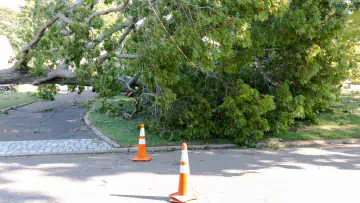Your storm damage checklist (and why insurance for storm damage should be a part of it)
If you own or operate a business, you want your days to go as smoothly and predictably as possible. Unfortunately, the weather doesn’t always cooperate. That’s why insurance for storm damage is essential. It can help you get past severe weather events with minimal expenses and business disruption.
Also essential is knowing what to do when your business has been affected by a storm and understanding how weather-related insurance claims work.
We’ve created a storm damage checklist that lays out the steps to take after a severe weather event. Let’s start there!

Critical steps after a storm
Severe weather has moved through your area and caused property damage to your business. Now what? Taking the steps below will help you recover quickly and minimize the negative impact on your operations.
- Ensure employees and customers are safe. Of course, your top priority after a storm will be ensuring your team members and any customers or clients who were onsite are safe. If anyone’s been injured, help them get medical attention.
- Assess the safety of your physical space. From roof damage to downed power lines, storms can leave all kinds of destruction in their wake. Carefully assess the storm damage. If there are safety risks, evacuate your space and contact the appropriate people—like first responders or utility companies.
- Prevent further property damage. When it’s safe to do so, do what you can to prevent further damage, such as putting plastic over broken windows to keep rain out or moving equipment and supplies to a safe location.
- Contact biBerk. Our claims experts can provide crucial insights on how to proceed. They’ll also start your storm damage insurance claim if you haven’t done that online.
- Take pictures and notes. When it’s safe, document the storm damage by taking pictures and making notes about the event. It’s especially important to write down what happened as soon as possible. Experiencing severe weather can be traumatic, making it hard to recall later exactly what happened.
- Work closely with biBerk’s claims team. Leveraging your storm damage insurance coverage will be a collaboration between you and our team. The quicker you can respond to communications like requests for additional details, the faster your claim will move.
- Keep your customers/clients informed. The people who buy your products or use your services will want to know the status of your operations after a severe storm. It’s important to contact them and let them know where things stand. That might include direct outreach to existing customers/clients and a banner message on your website to update online visitors. Will you be operating as usual? Will there be service or product-delivery delays? Setting expectations about business disruption is really important.
Business Owners Policy: Crucial storm damage insurance and more
An excellent way to protect your business from the financial effects of severe weather and storm damage is to have a business owners policy (BOP) from biBerk. It combines property insurance with liability coverage.
The property protection in a BOP includes:
The liability protection in a BOP is also crucial for small businesses, so it’s great that you get it under the same policy. The coverage includes:
Steps to take before storms hit
We explained the steps to follow after a storm above, but you can also take actions before severe weather strikes to help keep storm damage from hurting your business. The first is to get the insurance you need. You can get instant online quotes for a BOP or any biBerk policy whenever it's convenient. You can also purchase your policy online, with coverage typically active the next day.
Another helpful storm-prep step is researching the companies and entities that can help you deal with storm damage. This includes knowing how to connect with your utility providers and local government entities in an emergency.
It’s also a good idea to search for service providers like electricians, plumbers, roofing contractors, and others so you can reach out to them right away after suffering storm damage. Deciding who you’ll call if needed and having their contact information handy helps you get in touch with them quickly when they’re probably getting lots of service requests!
Dealing with severe weather is never fun for business owners, but having insurance for storm damage helps protect you from the financial fallout. In addition, knowing the steps to take after an incident prepares you to shift into recovery mode quickly so you don’t have to fear those storm clouds on the horizon!